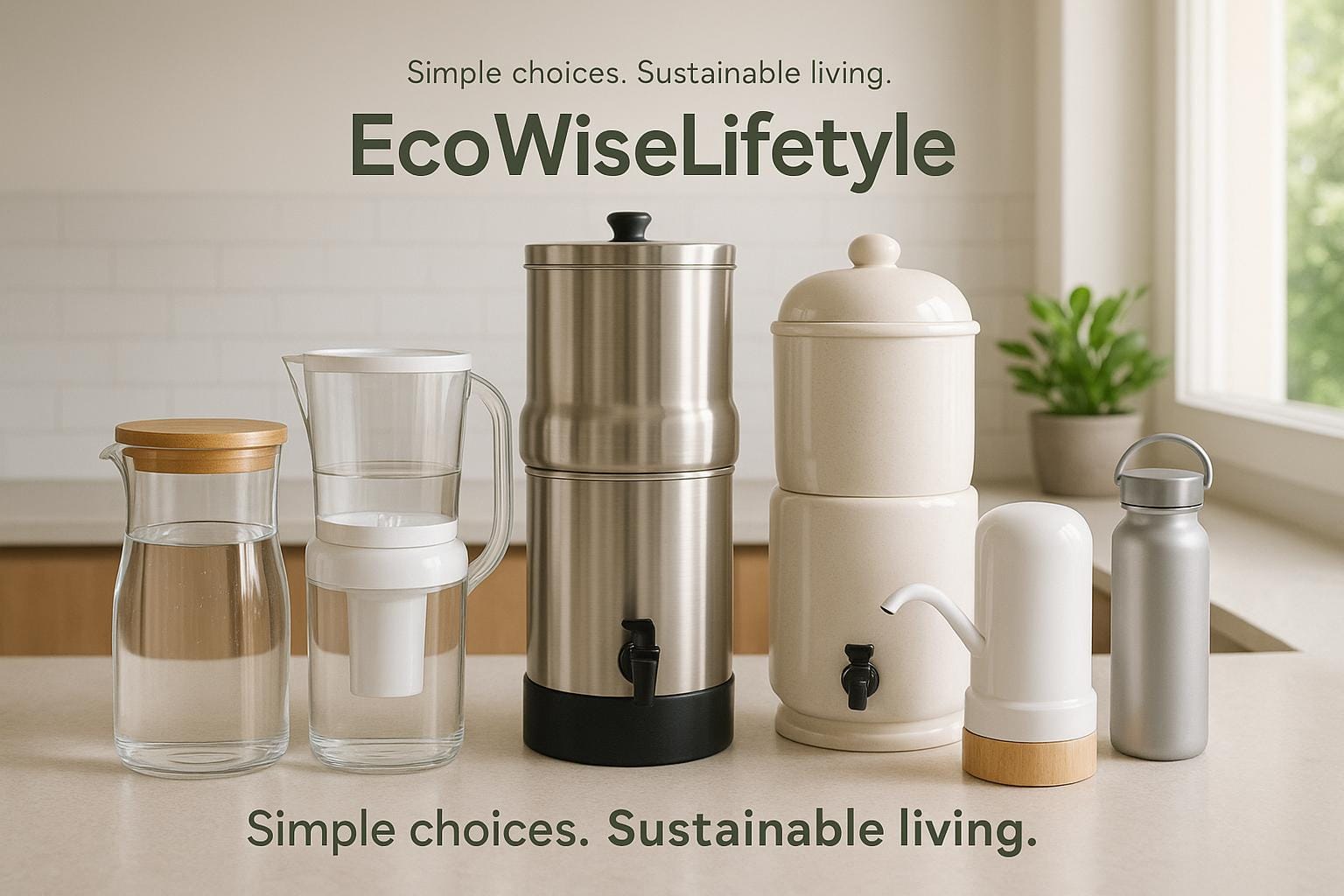Looking for water filters that are better for the planet? Here’s a quick guide to seven eco-friendly water filtration options that reduce waste, save money, and keep your water clean.
Key Takeaways:
- Cut Plastic Waste: These filters replace thousands of single-use plastic bottles annually.
- Sustainable Materials: Many use compostable or reusable components.
- Cost-Effective: Long-lasting filters mean fewer replacements and lower costs over time.
- Certified Clean Water: Look for NSF/ANSI certifications to ensure safety and quality.
Filters Covered:
- Glacier Fresh Compostable Filter: Plant-based, compostable, lasts up to 3,000 gallons.
- LifeStraw Glass Pitcher: Dual filtration, removes bacteria, PFAS, and heavy metals.
- Berkey Stainless Steel System: Long-lasting filters, no electricity needed.
- Kishu Binchotan Charcoal Sticks: Natural purification, biodegradable, lasts 4 months.
- AquaTru Countertop RO: Compact reverse osmosis, 80% water efficiency.
- Fil₂R Reusable Pod System: Refillable pods, compatible with Brita pitchers.
- Waterdrop Tankless RO: Space-saving, high water efficiency with UV sterilization.
Quick Comparison Table
| Filter | Type | Lifespan | Initial Cost | Annual Cost | Features |
|---|---|---|---|---|---|
| Glacier Fresh | Compostable Pitcher | 3,000 gallons | $229.99 | Low | Compostable, plant-based materials |
| LifeStraw Glass Pitcher | Dual Filtration Pitcher | 264 gallons/1 year | $64.95 | Moderate | Removes bacteria, PFAS, heavy metals |
| Berkey System | Gravity Stainless Steel | 6,000 gallons | $367.00 | Low | Durable, no electricity needed |
| Kishu Charcoal Sticks | Natural Charcoal | 4 months | ~$30 (set) | Low | Biodegradable, reusable |
| AquaTru Countertop RO | Reverse Osmosis | 6–24 months | $449.00 | Moderate | Compact, water-saving |
| Fil₂R Reusable Pod System | Reusable Pod | 40 gallons/2 months | $13.99 | Low | Compatible with Brita pitchers |
| Waterdrop G3P800 | Tankless Reverse Osmosis | 6–24 months | $599.00 | Moderate | Space-saving, UV sterilization |
Switching to eco-friendly water filters can reduce plastic waste, save money, and give you clean, safe water. Find the right one for your household size and water needs.
The sustainable water filter. No plastic waste.
1. Glacier Fresh Compostable Plant-Based Filter
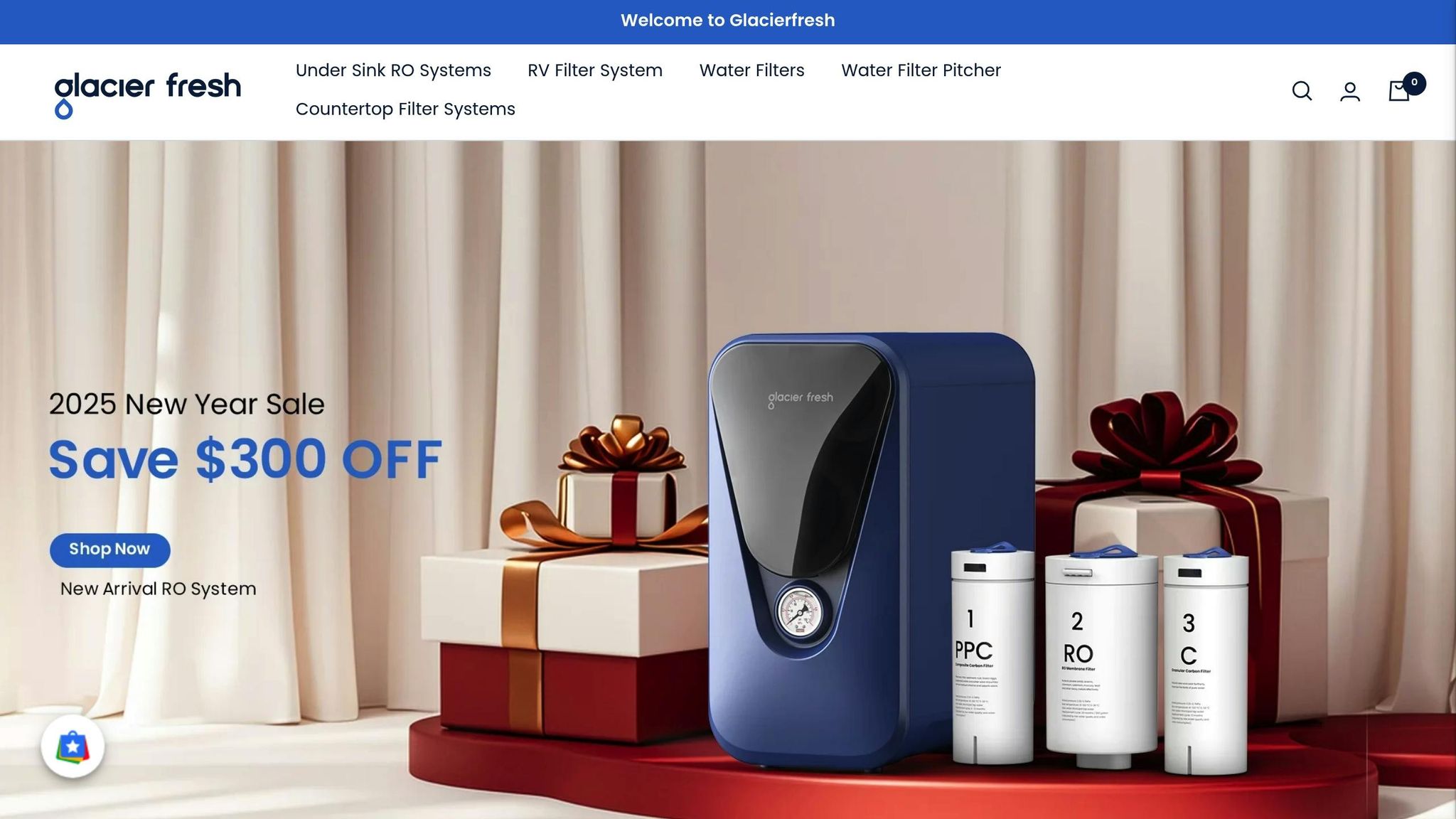
In March 2024, the Glacier Fresh filter made its debut as a step forward in eco-friendly water filtration. By combining compostable, plant-based plastic with activated carbon, it offers a sustainable alternative to conventional polypropylene filters.
Environmental Impact
This filter’s plastic housing decomposes into CO₂ and water within 180 days in industrial composting facilities. Over half of the material used comes from renewable resources, and the activated carbon is sourced from Sri Lankan coconut shells. Not only is the design environmentally conscious, but it also ensures reliable filtration.
Filtration Performance
Certified to meet NSF/ANSI 42 standards, the Glacier Fresh filter employs a multi-stage system to effectively reduce chlorine, mercury, sand, rust, suspended particles, and unpleasant tastes or odors.
Cost and Maintenance
Priced at $229.99, the Glacier Fresh system is designed for longevity, requiring fewer replacements:
- Carbon filters: Last up to 3,000 gallons
- Fluorine filters: Last up to 1,000 gallons
| Feature | Specification |
|---|---|
| Filter Lifespan | Up to 3,000 gallons |
| Compatibility | Fits original Brita pitchers |
| Certification | NSF/ANSI 42 |
| Composting Time | 180 days |
User Experience
With a Trustpilot rating of 4.2/5 from 109 reviews, users frequently commend its performance:
"This filter is amazing – works better than the original manufacture model. Water tastes great and at a great price. Will definitely buy all my water filters through Glacier from here on out. Thanks guys."
Practical Considerations
The system holds up to 7 cups of water. While its initial cost may be higher, its durability and reduced waste make it a worthwhile investment for those prioritizing sustainability.
2. LifeStraw Glass Pitcher with Dual Filtration
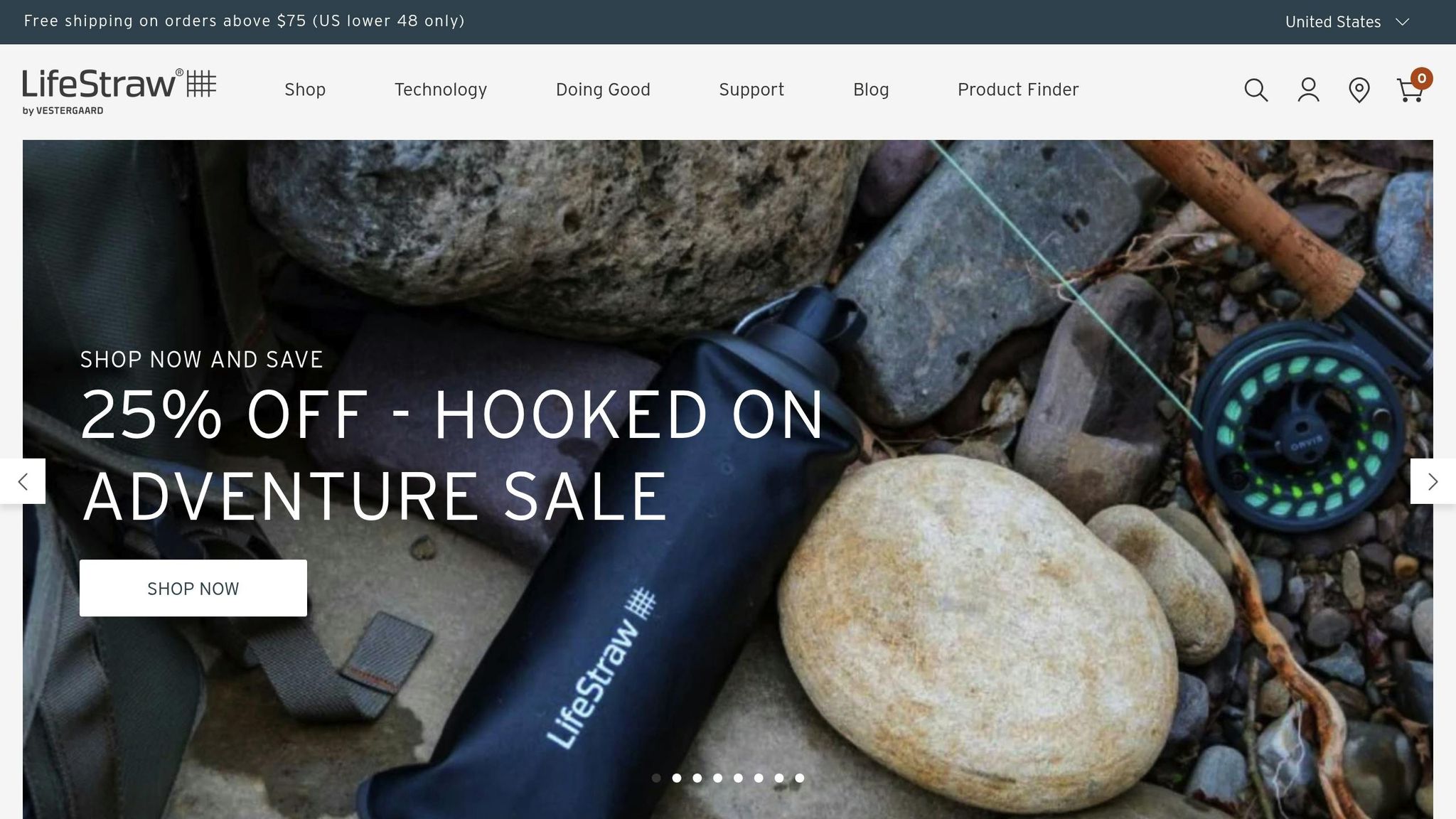
The LifeStraw Glass Pitcher combines sleek design with impressive filtration, making it a great choice for eco-conscious homes. Made from hand-blown borosilicate glass with a silicone base, it offers both durability and style. Here’s a closer look at its standout dual filtration system.
Advanced Dual Filtration Technology
This pitcher uses a two-step filtration process to ensure cleaner, safer water:
- Membrane Microfilter
Eliminates 99.999999% of bacteria, 99.999% of parasites, and 99.999% of microplastics. This filter lasts for about 264 gallons, which is roughly a year of use. - Activated Carbon + Ion Exchange Filter
Reduces heavy metals, PFAS, chlorine, and unpleasant odors. This filter is effective for up to 40 gallons, lasting approximately two months.
Performance and Certifications
The LifeStraw Glass Pitcher is NSF P473 certified for its ability to reduce PFAS levels. In independent tests of 12 water filter pitchers, it significantly lowered chlorine concentrations from over 10 mg/l to just 0.5 mg/l.
| Feature | Specification |
|---|---|
| Capacity | 7 cups (56 ounces) |
| Microfilter Lifespan | 264 gallons (1 year) |
| Carbon Filter Lifespan | 40 gallons (2 months) |
| Material | Borosilicate glass |
| Overall Rating | 4.7/5 (1,659 reviews) |
Cost Analysis
- Pitcher with filters: $64.95
- Single carbon filter: $16.95
- 6-month carbon filter pack: $39.95
- Membrane filter replacement: $24.95
User Experience
Users appreciate the pitcher for its performance and stylish design. Judith shared her thoughts:
"I’m trying to eliminate plastic as much as possible & this pitcher is a good start. The design of it is modern & it doesn’t take up a lot of room in the fridge. Now, I don’t taste chlorination anymore."
Maintenance Tips
To keep the pitcher performing well, replace the filters as recommended and hand-wash the glass (without soap) to maintain its quality.
3. Berkey Stainless Steel Gravity System
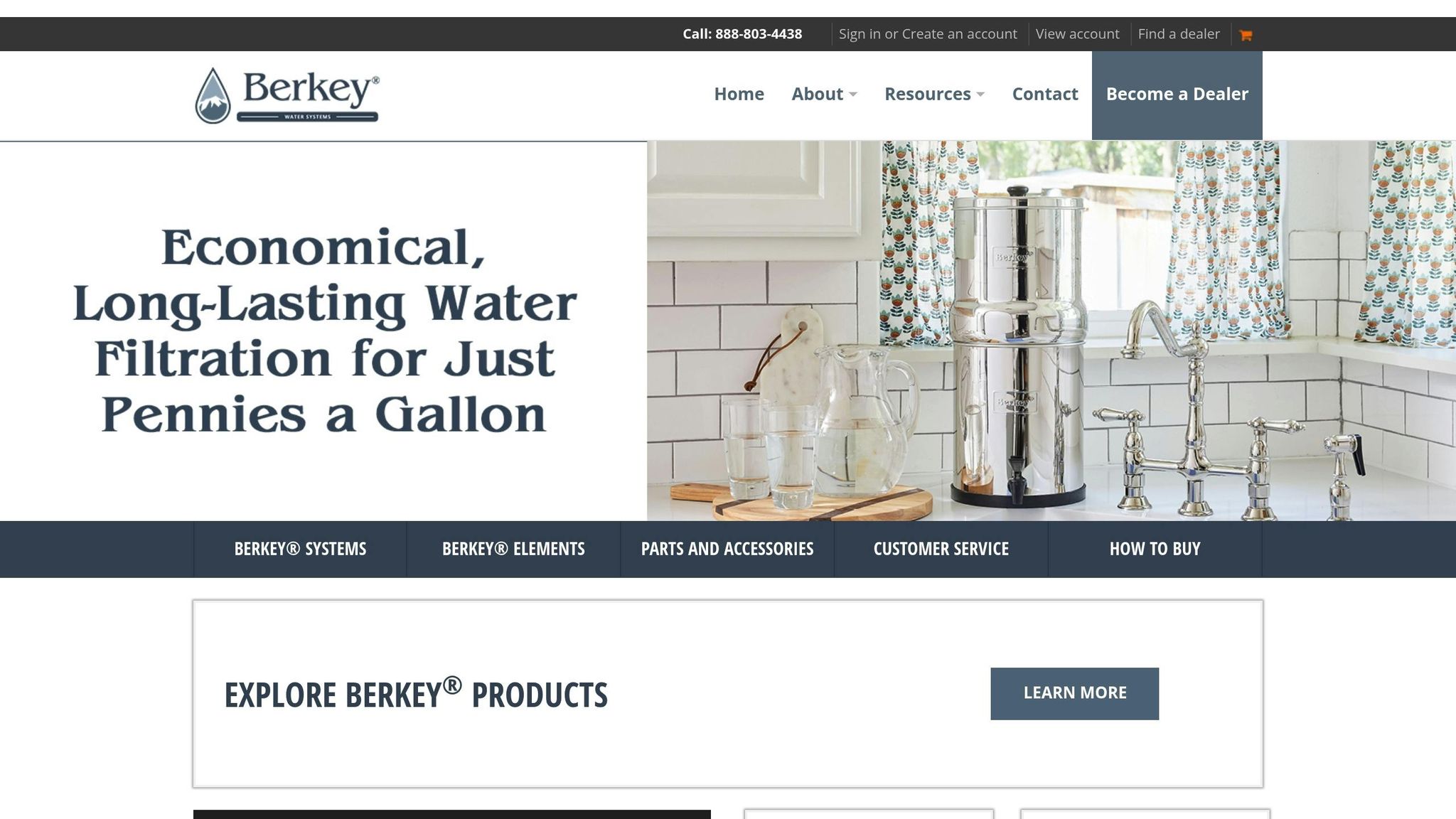
The Berkey Stainless Steel Gravity System is a durable, stainless-steel, gravity-fed water purifier that delivers top-notch filtration without needing electricity or plumbing connections.
How It Purifies Water
The system uses Black Berkey purification elements, which are designed to remove a wide range of contaminants while keeping essential minerals intact. Here’s how it performs:
| Contaminant Type | Efficiency |
|---|---|
| Heavy Metals (Lead, Mercury) | >99.9% |
| Chlorine and Chloramines | >99.9% |
| Pharmaceuticals | >99.5% |
| PFAS Compounds | >99.9% |
| Herbicides and Pesticides | >99.9% |
Cost and Long-Term Benefits
The Big Berkey system is priced at $367.00 and provides excellent long-term value:
- Filters up to 6,000 gallons before needing replacement.
- Purifies water at an average cost of about $0.03 per gallon.
- Processes 3.5 gallons of water per hour using two filter elements.
- With proper care, the system can last between 2 to 5 years.
Maintenance Made Simple
To keep the Berkey in peak condition, follow these maintenance steps:
- Monthly: Clean the stainless steel chambers.
- Every Six Months: Clean the filter elements.
- Twice a Year: Perform Red Dye Tests to confirm the filters are working properly.
- As Needed: Replace Black Berkey elements after filtering 6,000 gallons (depending on water quality).
These tasks ensure the purifier consistently delivers safe, clean water.
What Users Say
Long-time users frequently highlight the system’s dependability and performance. Joel C. shares his experience:
"I have been using a Berkey water filter for many years. The community well system in my rural neighborhood has good water, but the Berkey makes it taste like great water! I can trust that the water I drink is safe and pure."
Whether filtering tap water or well water, the Berkey system consistently delivers clean, great-tasting water. Its ability to handle a variety of water sources makes it a standout choice for households looking for eco-conscious and reliable filtration options.
4. Kishu Binchotan Charcoal Sticks
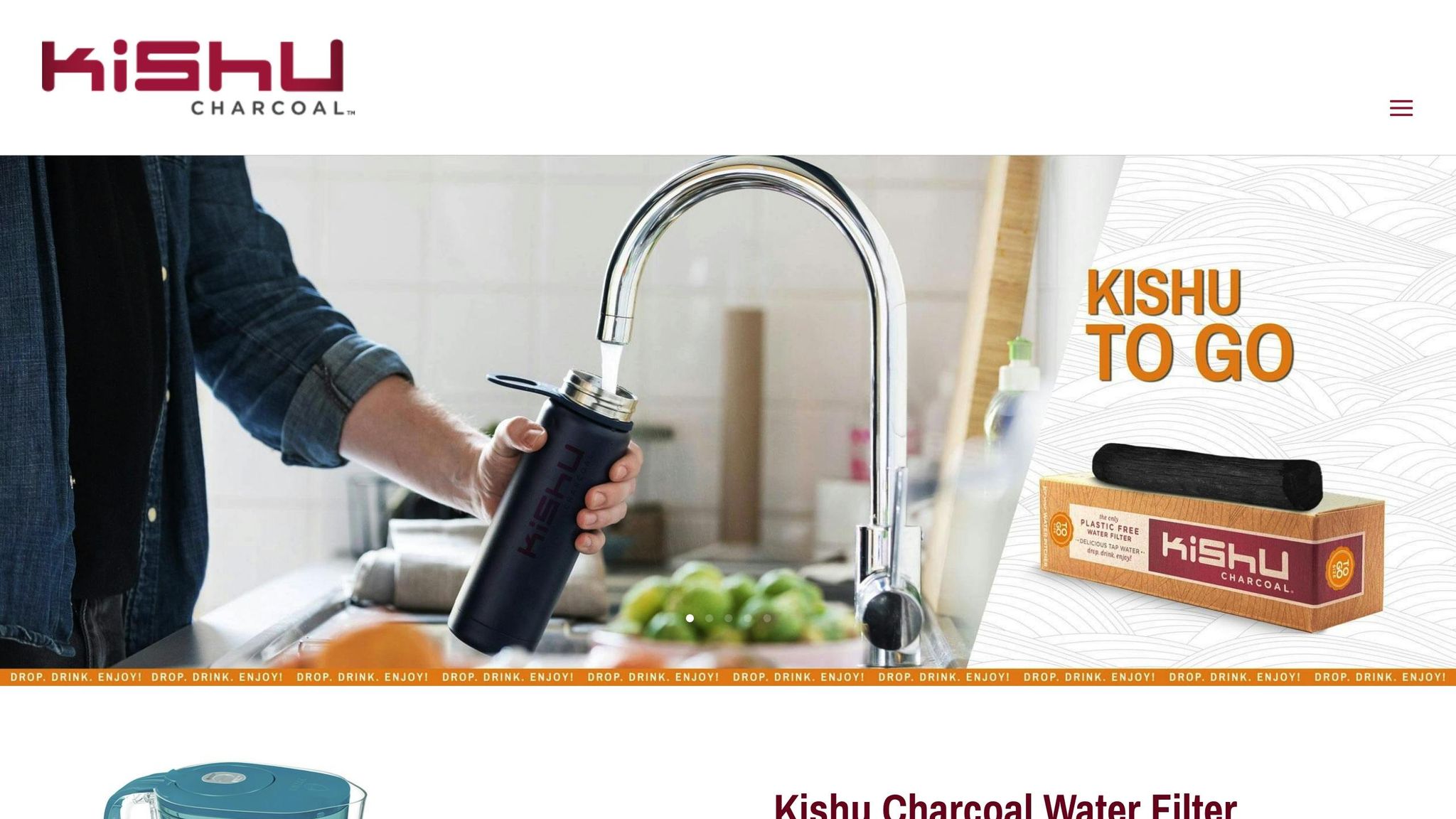
Kishu Binchotan charcoal sticks provide a natural way to filter water. Made from carefully selected Japanese Holm oak branches that are baked over several weeks, these sticks are composed of up to 98% carbon.
Natural Purification Power
The structure of Binchotan charcoal is nothing short of impressive. With an internal surface area of around 270 m² per gram, it can effectively remove chlorine taste, absorb impurities, alkalize water, and even infuse it with minerals.
| Purification Benefits | Environmental Impact |
|---|---|
| Removes chlorine taste | Fully biodegradable |
| Absorbs impurities | Can be reused for up to 4 months |
| Alkalizes water | Recyclable as a soil enhancer |
| Adds minerals |
Usage and Maintenance
To get the best results from your Binchotan charcoal sticks, follow these steps:
- Initial Preparation
Start by boiling the stick for 10 minutes. Let it cool completely before placing it in your water container. Allow at least five hours for the filtration process to work effectively. - Regular Maintenance
Every 2–3 weeks, re-boil the stick for 10 minutes to clear out the impurities it has absorbed and maintain its filtering efficiency. - Replacement Schedule
Plan to replace your stick after about four months of regular use. Once it’s done filtering, you can repurpose the charcoal for other uses around your home.
These straightforward maintenance steps ensure both optimal performance and long-term value.
Sustainability and Value
A set of three Kishu Binchotan sticks can filter up to 2 liters of water each and has earned an impressive 4.5/5 rating. Beyond being cost-effective, these sticks are kind to the environment. The oak branches used are selectively harvested to protect the trees, and when the charcoal’s filtering days are over, it can be reused as a natural deodorizer, a dehumidifier, or even added to garden soil to enrich plant growth.
sbb-itb-8f4b94a
5. AquaTru Countertop Reverse Osmosis
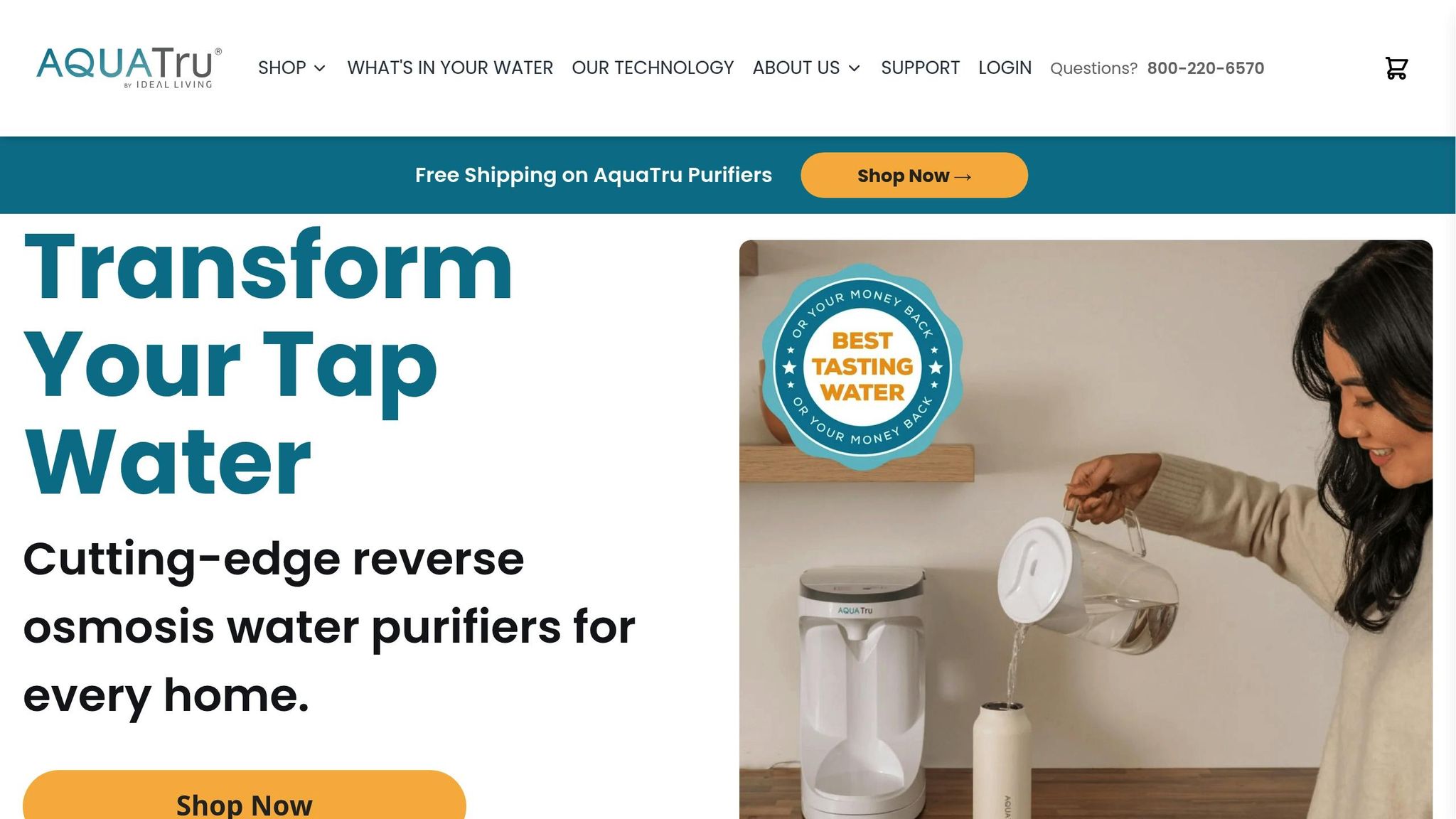
The AquaTru Countertop Reverse Osmosis system provides a compact and efficient solution for purifying water while being mindful of the environment. Using a patented 4-stage filtration process, it removes up to 99% of contaminants and achieves an impressive 80% water efficiency rate.
Advanced Purification Technology
AquaTru’s Ultra Reverse Osmosis Technology recycles water, avoiding the waste associated with traditional systems, which typically discard 3–5 gallons for every gallon purified. Instead, contaminants are concentrated in the tap tank. Here’s how it performs:
| Performance Metric | AquaTru System |
|---|---|
| Water Efficiency | 0.75 gallon of pure water per gallon of tap water |
| Contaminant Removal | Removes 83+ harmful substances |
| Plastic Reduction | Saves 4,500 bottles every 6 months |
| Customer Satisfaction | 98% of users report cleaner, safer water |
Maintenance and Longevity
This system is designed to be user-friendly, with minimal upkeep required. A digital display notifies users when filters need replacing, ensuring consistent performance. The replacement schedule is straightforward:
| Filter Component | Replacement Timeline |
|---|---|
| Pre-Filter | Every 6 months or 600 gallons |
| RO Filter | Every 2 years or 1,200 gallons |
| VOC Filter | Every year or 600 gallons |
This simplicity makes it easy to maintain while contributing to its environmentally conscious design.
Environmental Impact
AquaTru uses BPA- and BPS-free Tritan plastic for its water tanks, ensuring safe and sustainable water storage. To date, customers have helped prevent over 2 billion single-use plastic bottles from polluting landfills and waterways.
Investment Considerations
The AquaTru Classic Countertop Purifier is priced at $449.00, while the Carafe model is available for $359.00. Considering its ability to replace thousands of plastic bottles and its superior filtration – removing 15 times more contaminants than standard filtration pitchers – this system offers excellent value for anyone seeking cleaner water.
"AquaTru’s patented technology is 80% more efficient than traditional reverse osmosis (R.O.) systems. It recirculates water and concentrates contaminants in the tap water tank – resulting in more water filtered and less waste."
6. Fil₂R Reusable Filter Pod System
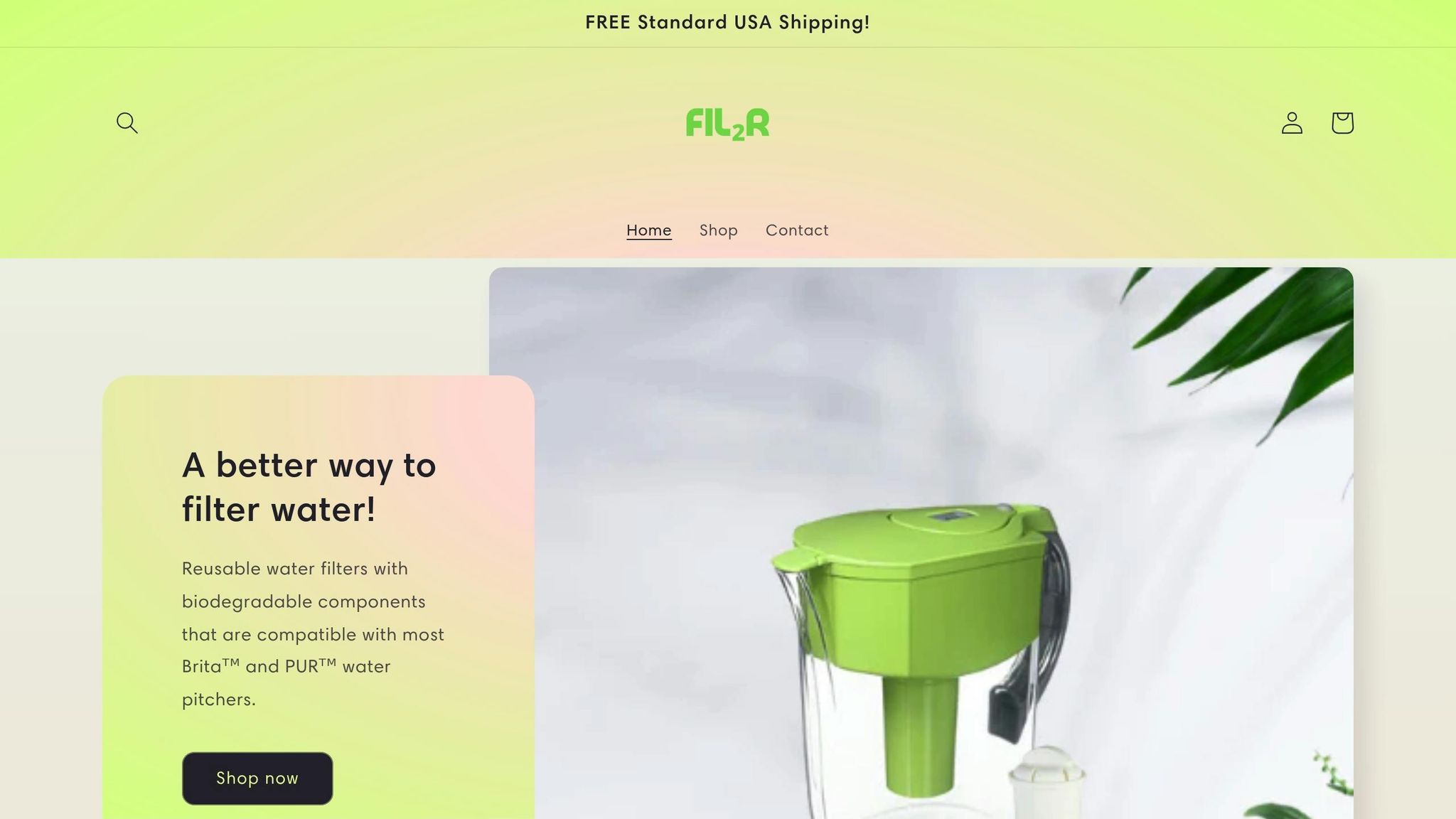
The Fil₂R Reusable Filter Pod System is a water filtration solution designed with sustainability in mind. Its pod-based structure not only ensures clean water but also aligns with efforts to minimize environmental impact.
Sustainable Design
The system features a reusable case crafted from recyclable polypropylene, while the filter pods use activated carbon sourced from coconut shells. This is wrapped in a blend of cotton and polyester that’s environmentally friendly. Together, these materials create a filtration system that’s both effective and eco-conscious.
| Environmental Impact | Measurement |
|---|---|
| Plastic Bottles Replaced (per pod) | 300 bottles (16.9 oz) |
| Carbon Footprint Reduction | 1,323 lbs CO₂ per case |
| Total Bottles Replaced (per case) | 7,200 bottles |
Filtration Performance
The Fil₂R system doesn’t just prioritize sustainability – it also provides reliable water purification. The activated carbon from coconut shells works in tandem with the pod’s design to filter out contaminants effectively. Plus, it’s compatible with Brita water pitchers, making it a convenient option for many households.
Maintenance Protocol
Taking care of the Fil₂R system is simple and ensures continued performance:
| Maintenance Aspect | Specification |
|---|---|
| Filter Pod Lifespan | 40 gallons or 2 months |
| Preparation Time | Soak for 15 minutes |
| Case Material | Recyclable polypropylene |
Cost Analysis
This system provides an affordable way to filter water while being kind to the planet:
- Initial Cost: Reusable Filter Case – $13.99
- Refill Cost: 3-Pack Eco-pods – $20.99
"The water filter replacement features a reusable case made of premium recyclable material, dramatically cutting down on plastic waste." – Fil₂R water
Even the packaging reflects its eco-friendly focus, using recyclable mailer boxes and biodegradable materials for the pods.
7. Waterdrop Tankless Reverse Osmosis
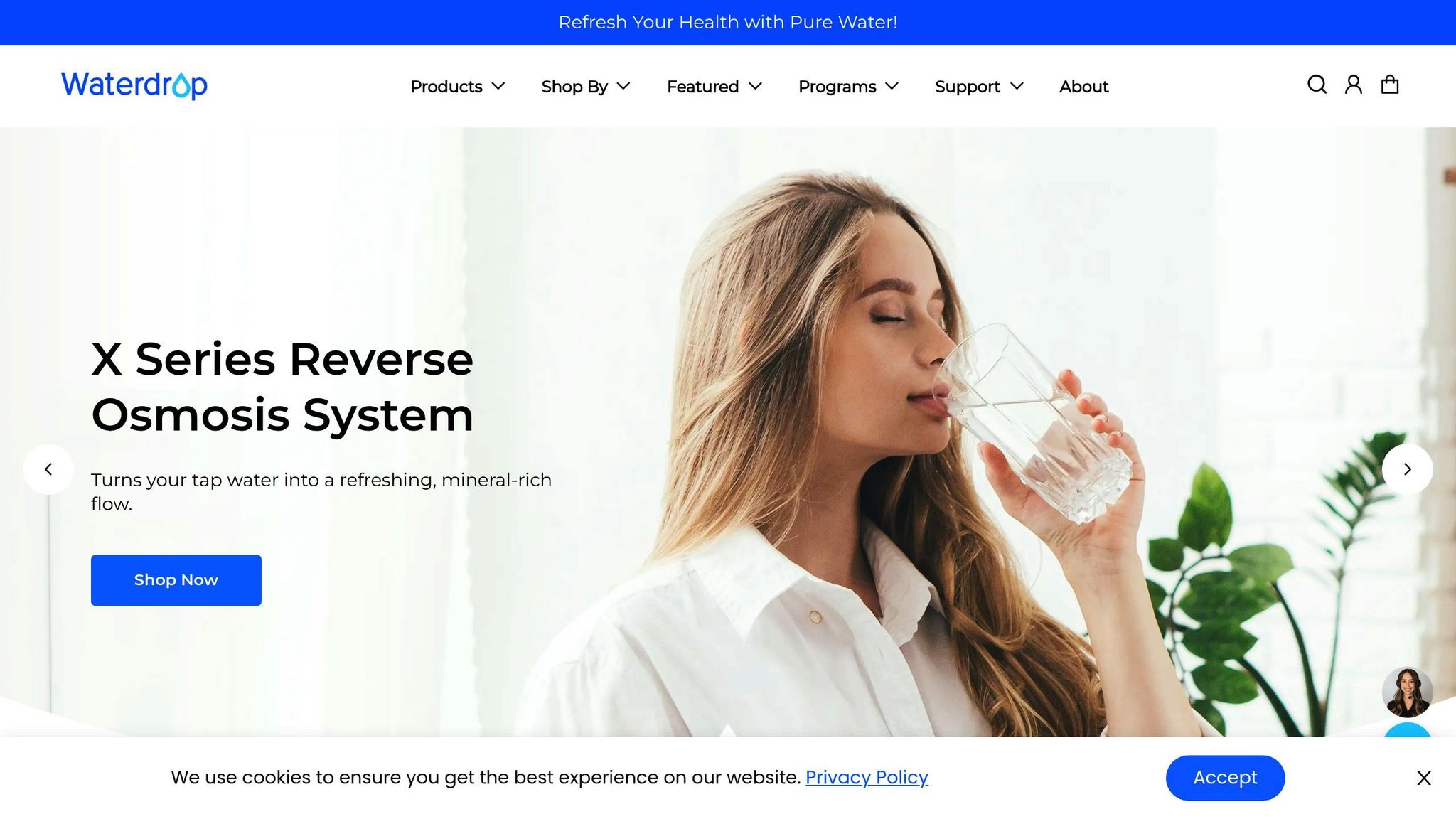
The Waterdrop G3P800 takes water filtration to the next level by blending efficient water-saving technology with a compact, space-conscious design.
Space-Saving Design
Say goodbye to the bulky storage tanks of traditional systems. The G3P800’s tankless design frees up to 70% of your under-sink space. This makes it a perfect fit for homes where every inch of cabinet space counts.
High-Performance Filtration
Here’s how the Waterdrop G3P800 stacks up against traditional reverse osmosis systems:
| Feature | Waterdrop G3P800 | Traditional RO Systems |
|---|---|---|
| Pure to Drain Ratio | 3:1 | 1:4 |
| Daily Capacity | 800 gallons | Varies |
| UV Sterilization | Built-in | Requires separate purchase |
The built-in UV sterilization feature is a standout, ensuring cleaner water without the need for additional equipment.
Easy Maintenance
Keeping the G3P800 running smoothly is straightforward and cost-efficient. Here’s a breakdown of the filter replacement schedule and costs:
| Filter Type | Replacement Schedule | Average Cost |
|---|---|---|
| CF Filter | Every 6 months | $29.99 |
| CB Filter | Every 12 months | $29.99 |
| RO Filter | Every 24 months | $139.99 |
The UV sterilizing lamp, with an impressive lifespan of up to 50 years, further reduces maintenance efforts and costs over time. This thoughtful design complements the system’s water-saving features.
Water-Saving Benefits
The G3P800’s advanced dispensing system significantly reduces water waste compared to traditional models, making it an environmentally friendly choice for households looking to conserve resources.
Cost Overview
While the initial cost of the G3P800 may be higher, the annual maintenance averages $159.97. When you factor in its water-saving capabilities, reduced maintenance needs, and built-in UV sterilization, it offers excellent long-term value for eco-conscious families.
Filter Comparison Chart
| Filter Model | Contaminant Removal | Filter Lifespan | Initial Cost | Annual Cost* | Features |
|---|---|---|---|---|---|
| LifeStraw Home 7-Cup Glass | Bacteria, Lead, PFAS, Microplastics | 2–3 months | $34.99 | $244 | Retains essential minerals; glass construction |
| Berkey System | Multiple contaminants | 6,000 gallons | $408.00 | $53 | Long filter life; stainless steel build |
| AquaTru Countertop RO | 100% contaminant reduction | 6–24 months | $299.00 | $150 | NSF certified; compact design |
*Annual costs are estimated based on filtering 160 gallons per month.
This chart breaks down the performance and cost of each filter, helping you weigh the options based on your needs. Whether you’re looking for long-term savings, specific contaminant removal, or a sleek design, there’s a solution here for everyone.
Environmental Impact
| Filter Type | Plastic Bottles Replaced | Waste Reduction Features |
|---|---|---|
| Pitcher Filters | Up to 1,800 annually | Replaceable cartridges |
| Reverse Osmosis | – | Minimal plastic waste |
| Ceramic Filters | – | Cleanable and reusable design |
| Activated Carbon | – | Uses less plastic than traditional pitchers |
Each filter type contributes to reducing environmental harm in its own way. For instance, pitcher filters can eliminate the need for thousands of plastic bottles, while ceramic filters offer reusable designs that cut down on waste. These options not only provide clean water but also help you make eco-conscious choices for a healthier planet.
Final Thoughts
Picking the right eco-friendly water filter boils down to understanding your household’s needs, how much water you use, and your budget. For smaller households, pitcher filters are a budget-friendly option. Larger families might find high-capacity systems a better fit, as they offer long-term savings and reduce waste over time.
Your choice of water filter can have a real impact on the environment. Switching to an eco-friendly option helps cut down on the staggering four million tons of trash produced globally every day. To maximize your contribution, consider filters with recyclable parts and minimal plastic use.
Here’s a quick guide to help you decide based on your household size and water usage:
| Household Type | Recommended Filter Type | Monthly Usage | Initial Cost Range |
|---|---|---|---|
| Small (1‑2 people) | Pitcher Filters | 40–80 gallons | $17–$54 |
| Medium (3‑4 people) | Countertop Systems | 80–160 gallons | $80–$1,179 |
| Large (5+ people) | Under-sink/RO Systems | 160+ gallons | $155–$2,200 |
This table can help you align your household’s needs with a filter that balances performance, cost, and eco-consciousness. With studies showing that at least 45% of U.S. tap water contains PFAS, it’s crucial to choose a filter certified to remove the specific contaminants in your water. The best choice is one that not only improves your water quality but also minimizes waste, reduces how often you need replacements, and supports a cleaner, greener planet.
FAQs
How do eco-friendly water filters reduce plastic waste?
Eco-friendly water filters are a smart way to tackle the issue of plastic waste. By providing clean, filtered water straight from your tap, they eliminate the need for single-use plastic water bottles. This simple switch can significantly cut down on disposable plastic consumption, making a big difference over time.
What’s more, many of these filters are crafted from sustainable or biodegradable materials, which helps lower their overall environmental footprint. Choosing one of these systems isn’t just about convenience – it’s a small but meaningful step toward reducing waste and embracing a greener way of living.
What factors should I consider when selecting an eco-friendly water filter for my home?
When picking a water filter that’s kinder to the planet, keep these three key points in mind:
- Eco-Friendly Materials: Choose filters made from natural or recycled materials, such as ceramic or activated carbon. These options help cut down on plastic waste and lessen environmental harm.
- Efficiency: Make sure the filter does its job well – removing contaminants – without wasting water or using too much energy. Systems like reverse osmosis and ultrafiltration are worth considering for their balance of effectiveness and resource use.
- Trusted Certifications: Check for certifications from bodies like NSF International. These ensure the filter meets strict safety and performance standards.
By focusing on these elements, you’ll not only get clean, safe drinking water but also make a choice that aligns with environmentally conscious living.
Do eco-friendly water filters work as well as traditional ones in removing contaminants?
Yes, eco-friendly water filters can work just as well as traditional ones, depending on their design and technology. Many of these filters use advanced techniques like activated carbon, which effectively removes chlorine, organic compounds, and other impurities. Some even incorporate modern materials like cellulose or silk to tackle harmful contaminants, including heavy metals and PFAS (often called "forever chemicals").
The effectiveness of any filter largely depends on the specific contaminants in your water and the filter’s capabilities. What sets eco-friendly options apart is their focus on sustainability – they often use renewable materials and generate less waste. This means you get reliable filtration while reducing your environmental impact. When selecting a filter, it’s important to weigh both its ability to remove contaminants and its environmentally conscious design to find the right fit for your needs.

